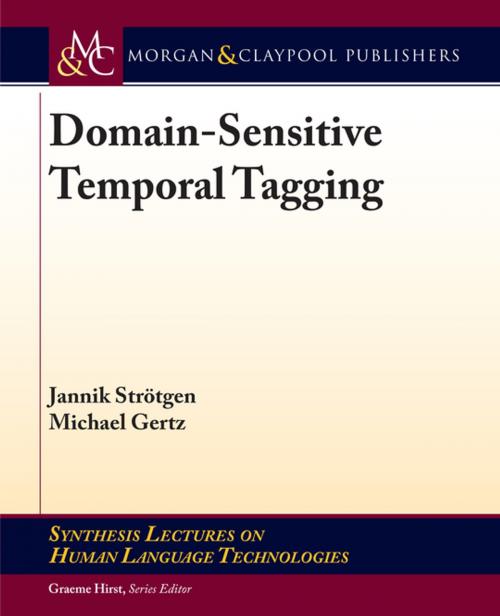Domain-Sensitive Temporal Tagging
Nonfiction, Computers, Advanced Computing, Natural Language Processing, Artificial Intelligence, Reference & Language, Language Arts, Linguistics| Author: | Jannik Strötgen, Michael Gertz | ISBN: | 9781681731858 |
| Publisher: | Morgan & Claypool Publishers | Publication: | July 28, 2016 |
| Imprint: | Morgan & Claypool Publishers | Language: | English |
| Author: | Jannik Strötgen, Michael Gertz |
| ISBN: | 9781681731858 |
| Publisher: | Morgan & Claypool Publishers |
| Publication: | July 28, 2016 |
| Imprint: | Morgan & Claypool Publishers |
| Language: | English |
This book covers the topic of temporal tagging, the detection of temporal expressions and the normalization of their semantics to some standard format. It places a special focus on the challenges and opportunities of domain-sensitive temporal tagging. After providing background knowledge on the concept of time, the book continues with a comprehensive survey of current research on temporal tagging. The authors provide an overview of existing techniques and tools, and highlight key issues that need to be addressed. This book is a valuable resource for researchers and application developers who need to become familiar with the topic and want to know the recent trends, current tools and techniques, as well as different application domains in which temporal information is of utmost importance.
Due to the prevalence of temporal expressions in diverse types of documents and the importance of temporal information in any information space, temporal tagging is an important task in natural language processing (NLP), and applications of several domains can benefit from the output of temporal taggers to provide more meaningful and useful results.
In recent years, temporal tagging has been an active field in NLP and computational linguistics. Several approaches to temporal tagging have been proposed, annotation standards have been developed, gold standard data sets have been created, and research competitions have been organized. Furthermore, some temporal taggers have also been made publicly available so that temporal tagging output is not just exploited in research, but is finding its way into real world applications. In addition, this book particularly focuses on domain-specific temporal tagging of documents. This is a crucial aspect as different types of documents (e.g., news articles, narratives, and colloquial texts) result in diverse challenges for temporal taggers and should be processed in a domain-sensitive manner.
This book covers the topic of temporal tagging, the detection of temporal expressions and the normalization of their semantics to some standard format. It places a special focus on the challenges and opportunities of domain-sensitive temporal tagging. After providing background knowledge on the concept of time, the book continues with a comprehensive survey of current research on temporal tagging. The authors provide an overview of existing techniques and tools, and highlight key issues that need to be addressed. This book is a valuable resource for researchers and application developers who need to become familiar with the topic and want to know the recent trends, current tools and techniques, as well as different application domains in which temporal information is of utmost importance.
Due to the prevalence of temporal expressions in diverse types of documents and the importance of temporal information in any information space, temporal tagging is an important task in natural language processing (NLP), and applications of several domains can benefit from the output of temporal taggers to provide more meaningful and useful results.
In recent years, temporal tagging has been an active field in NLP and computational linguistics. Several approaches to temporal tagging have been proposed, annotation standards have been developed, gold standard data sets have been created, and research competitions have been organized. Furthermore, some temporal taggers have also been made publicly available so that temporal tagging output is not just exploited in research, but is finding its way into real world applications. In addition, this book particularly focuses on domain-specific temporal tagging of documents. This is a crucial aspect as different types of documents (e.g., news articles, narratives, and colloquial texts) result in diverse challenges for temporal taggers and should be processed in a domain-sensitive manner.















